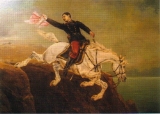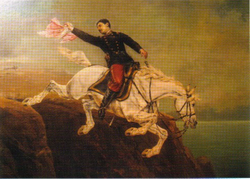
Alfonso Ugarte
Encyclopedia
Alfonso Ugarte was a Peru
vian military commander during the War of the Pacific
, between Peru and Bolivia
against Chile
. He ultimately rose to the rank of Colonel
.
Ugarte was born in Tarapacá
, Peru
, the son of the rich tarapaqueños retailers Don Narciso Ugarte and Doña Rosa Vernal. At an early age, he was sent by his parents to the Chile
an port of Valparaiso
where he was educated, finishing his studies in 1868. On his return to Peru, he settled in Iquique
, where he administered the family business. He was elected City Mayor in 1876.
At the beginning of the War of the Pacific
, Ugarte was about to leave the country for a business trip to Europe, but instead he decided to stay in order to organize a battalion using his own money. This unit was recruited from the workers and craftsmen of Iquique
. It was named "Battalion Iquique N° 1", and it consisted of 429 enlisted men and 36 officers.
He fought at the Battle of Tarapacá
, where he was injured. The Peruvian forces retreated following this battle, and merged with the Army of the South, commanded by Major General Juan Buendía; the combined force marched from Tarapaca
to Arica
.
Ugarte was head of the Eighth Division in the defense of the city of Arica
. In Arica, he participated in the two military councils held by Colonel Francisco Bolognesi
, where the agreement was made to defend the bastion "until burning the last round".
 Ugarte died fighting at Arica
Ugarte died fighting at Arica
. According to a poetic account of the battle, which has become folklore, Ugarte rode his horse over the Rock of Arica in order to prevent the Peruvian flag, which he was carrying, from being captured by the Chilean troops. In reality, Alfonso Ugarte fulfilled the promise to fight to the last bullet defending his position. He was buried in a known location in Arica.
Ugarte is today considered a Peruvian national hero.
Peru
Peru , officially the Republic of Peru , is a country in western South America. It is bordered on the north by Ecuador and Colombia, on the east by Brazil, on the southeast by Bolivia, on the south by Chile, and on the west by the Pacific Ocean....
vian military commander during the War of the Pacific
War of the Pacific
The War of the Pacific took place in western South America from 1879 through 1883. Chile fought against Bolivia and Peru. Despite cooperation among the three nations in the war against Spain, disputes soon arose over the mineral-rich Peruvian provinces of Tarapaca, Tacna, and Arica, and the...
, between Peru and Bolivia
Bolivia
Bolivia officially known as Plurinational State of Bolivia , is a landlocked country in central South America. It is the poorest country in South America...
against Chile
Chile
Chile ,officially the Republic of Chile , is a country in South America occupying a long, narrow coastal strip between the Andes mountains to the east and the Pacific Ocean to the west. It borders Peru to the north, Bolivia to the northeast, Argentina to the east, and the Drake Passage in the far...
. He ultimately rose to the rank of Colonel
Colonel
Colonel , abbreviated Col or COL, is a military rank of a senior commissioned officer. It or a corresponding rank exists in most armies and in many air forces; the naval equivalent rank is generally "Captain". It is also used in some police forces and other paramilitary rank structures...
.
Ugarte was born in Tarapacá
Tarapacá
Tarapacá may refer to:*Tarapacá Province, Chile, a former province, now divided into**Tarapacá Region**Arica-Parinacota Region*Tarapacá Department , a former department of Peru...
, Peru
Peru
Peru , officially the Republic of Peru , is a country in western South America. It is bordered on the north by Ecuador and Colombia, on the east by Brazil, on the southeast by Bolivia, on the south by Chile, and on the west by the Pacific Ocean....
, the son of the rich tarapaqueños retailers Don Narciso Ugarte and Doña Rosa Vernal. At an early age, he was sent by his parents to the Chile
Chile
Chile ,officially the Republic of Chile , is a country in South America occupying a long, narrow coastal strip between the Andes mountains to the east and the Pacific Ocean to the west. It borders Peru to the north, Bolivia to the northeast, Argentina to the east, and the Drake Passage in the far...
an port of Valparaiso
Valparaíso
Valparaíso is a city and commune of Chile, center of its third largest conurbation and one of the country's most important seaports and an increasing cultural center in the Southwest Pacific hemisphere. The city is the capital of the Valparaíso Province and the Valparaíso Region...
where he was educated, finishing his studies in 1868. On his return to Peru, he settled in Iquique
Iquique
Iquique is a port city and commune in northern Chile, capital of both the Iquique Province and Tarapacá Region. It lies on the Pacific coast, west of the Atacama Desert and the Pampa del Tamarugal. It had a population of 216,419 as of the 2002 census...
, where he administered the family business. He was elected City Mayor in 1876.
At the beginning of the War of the Pacific
War of the Pacific
The War of the Pacific took place in western South America from 1879 through 1883. Chile fought against Bolivia and Peru. Despite cooperation among the three nations in the war against Spain, disputes soon arose over the mineral-rich Peruvian provinces of Tarapaca, Tacna, and Arica, and the...
, Ugarte was about to leave the country for a business trip to Europe, but instead he decided to stay in order to organize a battalion using his own money. This unit was recruited from the workers and craftsmen of Iquique
Iquique
Iquique is a port city and commune in northern Chile, capital of both the Iquique Province and Tarapacá Region. It lies on the Pacific coast, west of the Atacama Desert and the Pampa del Tamarugal. It had a population of 216,419 as of the 2002 census...
. It was named "Battalion Iquique N° 1", and it consisted of 429 enlisted men and 36 officers.
He fought at the Battle of Tarapacá
Battle of Tarapacá
The Battle of Tarapacá occurred on November 27, 1879 during the Tarapacá Campaign of the War of the Pacific. A Chilean column of 2,300 soldiers led by General Luis Arteaga recklessly attacked an outnumbering Peruvian contingent of 4,500 troops at Tarapacá commanded by Gen Juan Buendía, resulting in...
, where he was injured. The Peruvian forces retreated following this battle, and merged with the Army of the South, commanded by Major General Juan Buendía; the combined force marched from Tarapaca
Tarapacá
Tarapacá may refer to:*Tarapacá Province, Chile, a former province, now divided into**Tarapacá Region**Arica-Parinacota Region*Tarapacá Department , a former department of Peru...
to Arica
Arica
Arica is a city in northern Chile. "Arica" may also refer to:Places* Arica and Parinacota Region, Chile* Arica Airport , Chile* Arica, Amazonas, town in Colombia* Rio Aricá-açu, tributary of the Cuiabá River south of Cuiabá, BrazilOther...
.
Ugarte was head of the Eighth Division in the defense of the city of Arica
Arica
Arica is a city in northern Chile. "Arica" may also refer to:Places* Arica and Parinacota Region, Chile* Arica Airport , Chile* Arica, Amazonas, town in Colombia* Rio Aricá-açu, tributary of the Cuiabá River south of Cuiabá, BrazilOther...
. In Arica, he participated in the two military councils held by Colonel Francisco Bolognesi
Francisco Bolognesi
Francisco Bolognesi Cervantes was a Peruvian military hero. He is considered national hero in Peru and was declared patron of the Army of Peru by the government of Peru on January 2 of 1951.- Early life and education :...
, where the agreement was made to defend the bastion "until burning the last round".

Battle of Arica
The Battle of Arica, also known as Assault and Capture of Arica Cape, was a battle in the War of the Pacific. It was fought on 7 June 1880, between the forces of Chile and Peru....
. According to a poetic account of the battle, which has become folklore, Ugarte rode his horse over the Rock of Arica in order to prevent the Peruvian flag, which he was carrying, from being captured by the Chilean troops. In reality, Alfonso Ugarte fulfilled the promise to fight to the last bullet defending his position. He was buried in a known location in Arica.
Ugarte is today considered a Peruvian national hero.

